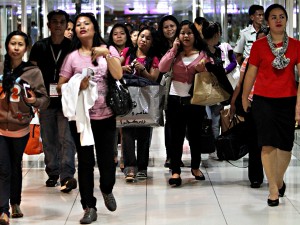DAVAO CITY, Philippines – The government’s repatriation of Filipino workers from strife-torn Syria has uncovered numerous cases of human trafficking, many involving recruits as young as 13, according to an official of the Inter-Agency Council Against Trafficking (Iacat).
Iacat executive officer Ruby Ramores said about 80 percent of the 1,800 Filipino workers brought home from Syria were victims of human trafficking, most of them from the provinces of Maguindanao, Basilan and Sulu in the Autonomous Region in Muslim Mindanao.
Ramores told reporters on the sidelines of an anti-human trafficking convention here on Friday that information about the trafficked victims was uncovered during a review of their documents for repatriation.
“Their travel documents did not bear departure details; travel stamps were counterfeited; they traveled on assumed identities and their passports were fake,” she said.
Ramores said they were illegally recruited either by friends or recruitment agencies three or five years ago. And many of them were between 13 and 18 years of age when they were shipped to Syria.
Ramores said some of the illegally recruited workers left the country via Malaysia or Singapore as first countries of entry before traveling on to the United Arab Emirates’ cities of Abu Dhabi and Dubai. From UAE, they went to Syria.
In leaving the Philippines, Ramores said, the illegal recruits were aided by corrupt immigration officials at airports and ports, who took a share of the estimated $37million generated annually by organized trafficking groups.
Ramores said Iacat expects to uncover more cases of human trafficking as the repatriation of workers from Syria continues.
She said that, based on an assessment by the Department of Foreign Affairs, at least 98 percent of the 10,000 overseas workers in Syria were undocumented.
Darlene Pajarito, a prosecutor of the Department of Justice in Western Mindanao, said they have confirmed that the ARMM was the primary hunting ground of human traffickers.
Superintendent Rodelio Jocson, Tawi-Tawi police chief, said action was being undertaken to prevent human traffickers from smuggling recruits out of Tawi-Tawi. He reported that several apprehensions and rescue operations had been carried out in recent months.
ARMM Assemblywoman Kim Datumanong said the legislative assembly was eyeing legislation to strengthen border patrols and conduct workshops and other activities aimed at checking human traffickers.
She said there was also a need to enhance the birth registration system in the five-province region to prevent unscrupulous people from faking birth documents.
